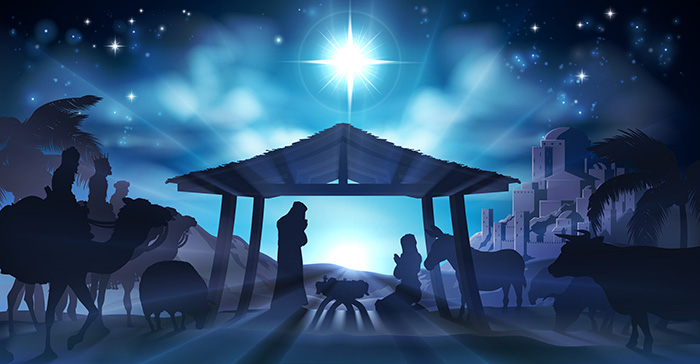Dear Friends,
Merry Christmas!!!! I hope this celebration of the birth of Christ fills you with hope and joy. This celebration is always a bit shocking because of what we are celebrating – that the God who created the entire universe takes on our human flesh and becomes one of us. I always think that if people are willing to believe the incredible news of the incarnation, then it is easy to believe the other things that Jesus teaches. If God is willing to become a baby, then entering bread and wine is no big leap.
Each year at Christmas, the Church gives us a number of different readings to choose from. If you and I were in a monastery we might go to three different Masses for Christmas – one the evening before, the Midnight Mass and one again on Christmas morning. Each Mass would have had different readings to help us prayerfully meditate on the wonder of God choosing to be one of us.
For pastoral reasons, many Catholic parishes choose to use the readings from Midnight Mass for all the Masses. Those readings are the ones you all know so well, Mary and Joseph looking for a place to stay in Bethlehem and angels announcing good news to shepherds. We follow that same approach. Sadly, you do not get the other major gospels for the day: the genealogy from Matthew’s Gospel and the beautiful, poetic theology of chapter one of John’s Gospel.
You might wonder why the Church even chooses those readings which do not seem to be very “Christmassy”. Both Matthew’s and John’s beginnings are filled with important points but they are not the romantic, fun story of shepherds and angels and a stable and animals and a manger and…
Let me share with you a couple quick points from the other options. In John’s Gospel, after describing how the Word was God he goes on to say that this Word became “flesh”. Flesh is our English translation. In Greek there are two possible choices for this word – soma and sarx. The Greeks used soma to describe the body and they meant the whole of being human – soul and mind, the beautiful, the ideal. Sarx was used to describe the more embarrassing parts of us, the body functions, wrinkles, hair in the wrong places, burps, etc. When John says the Word became flesh he uses sarx. He is saying Jesus takes on the messiness of our humanness. Nothing of our humanness is beyond redemption. God loves it all!
Matthew’s Gospel begins with the genealogy which seems like a strange way to begin an exciting story. Seems like Matthew needed an editor to help get the story right. However, Matthew is beginning with names because the names matter. The names are from real people, real histories. These people are Jesus’ ancestors, they are Jesus’ family. If you go through the list you will find Gentiles, prostitutes, sinners, and some of the darkest spots in the lives of some of Israel’s greatest heroes. This, Matthew tells us, is Jesus’ family. He wants us to know that Jesus redeems every part of us. No one and no act can keep us from God’s love for us. If you can find your story in the story of those people on the list, then you know you, too, are a part of the family of God.
Today, as we celebrate the birth of Jesus, we also celebrate that you and I are born of God. You are personally invited by Jesus to be a part of his family. Sisters and brothers of Jesus, Merry Christmas!
Peace,
Fr. Damian



